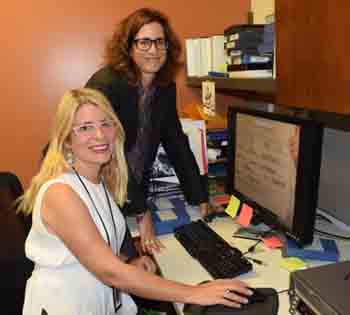
Sandra Aguilar and Daryn Eller
In a field dedicated to organizing and preserving information, it makes sense that USC Shoah Foundation archivists Sandra Aguilar and Daryn Eller say archivists are, as a whole, a particularly helpful bunch.
“That’s what we do – we share information from the archive to the public and to our users and researchers, and we also share information with each other,” Aguilar said. “It’s a really nice community to be working in because of the people and how incredibly knowledgeable they are.”
“It’s true,” Eller agreed. “It’s one of the professions that are about openness.”
Aguilar, archivist, and Eller, archival assistant, work in USC Shoah Foundation’s Information Technology Services (ITS) department. Aguilar, who joined the staff about a month ago, interprets and formats information and details about the interviewees and the interviews to be brought into the database systems of the Visual History Archive. She is also a liaison between USC Shoah Foundation’s research specialists and database programmers to develop ways for the testimonies to be searched and experienced.
Eller works with the USC Shoah Foundation Institutional Audio-Visual Collection, a database of the Institute’s personal recordings of everything from early staff meetings and interviewer trainings to press conferences. She organizes and describes these items so that they can be easily accessed by staff as well as researchers interested in the history of the Institute.
Though they are colleagues now, Aguilar and Eller took very different paths to joining the archiving profession. Aguilar majored in film studies at UC Santa Barbara and got her master’s in library and information science from UCLA. Her experience includes archiving positions at CBS Digital, Lucasfilm’s Industrial Light + Magic, and the WB Archives at USC School of Cinematic Arts.
For Eller, archiving is a second career. She worked as a magazine and book writer for many years before deciding to go back to school to get her master’s in library science at San Jose State with the idea of being a librarian. “But I couldn’t see myself at the reference desk,” Eller said.
She had fallen in love with archiving after taking a class, and began looking for volunteer archiving positions instead. USC Shoah Foundation is her first job and she was recently hired on as a regular staff member.
Aguilar and Eller said the archiving profession is getting more technology-focused than ever before. Now, new and experienced archivists need to know about digitization and migration techniques, metadata, how to store digital objects, and other skills.
However, Eller said USC Shoah Foundation was actually one of the first archives to utilize digital technology, and is still quite advanced compared to other archives like it.
“The Shoah Foundation pioneered some of this technology and continues to be on the cutting edge of technology,” she said.
Both Aguilar and Eller said working with the archives of USC Shoah Foundation is especially rewarding, not least of all because the testimonies in the Visual History Archive are so special. Aguilar added that it is particularly refreshing to see videos that are simple, not “over-produced” with special effects like film tends to be today.
“There’s so much material in the testimonies that is surprising. I think everyone watching a testimony can get something out of it and learn something about another person,” Aguilar said. “I’m really grateful for every one of those 52,000 people who sat down and [gave testimony]. That’s a tremendous thing they did.”